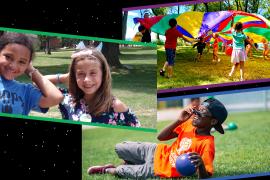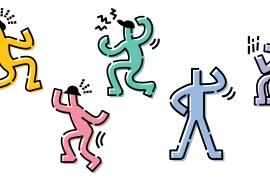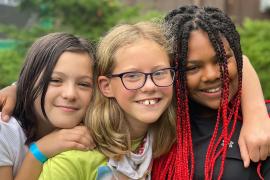Thirty-year-old African American Jamal Stroud exudes positivity and light. Not necessarily an intuitive state of being for someone who started life in New York City’s foster care system. Like many who have experienced the kind of adversity he faced as a child, Stroud could have embraced the mean streets. Instead, he has focused his energy on helping today’s young men of color rise above similar hardships. He founded Big Homie Lil Homie (BHLH), a nonprofit, volunteer mentoring organization, in 2017 in Columbia, South Carolina, where he now lives with his wife and two children. Stroud, who is described by one of his organization’s volunteer mentors as “the most humble person” he knows, has already grown BHLH to serve more than 225 at-risk boys in his community.
The Central Carolina Community Foundation, a nonprofit center for philanthropy, who declared Stroud the Best of Philanthropy Young Professional Winner in 2017, said he “makes impacting children’s lives . . . a full-time commitment” — which is right in line with Stroud’s personal goal to be a flesh-and-blood superhero to those kids who need help.
I read another interview with you and you said when you were in grade school you watched as parents picked up their children, but you didn’t have the liberty to say your mom or dad was coming to pick you up. And yet you knew at a young age that it was critical to have somebody important like that in your life. Tell us a little bit about your background and how it shaped you.
I grew up in Brooklyn, New York, in foster care. My mom and dad both suffered from alcohol and drug abuse. My mom basically left me in the hospital, and I was in seven different foster homes by the age of seven. That weighed heavily on me. I felt unloved and unwanted, and I blamed myself for that, but I didn’t understand how to articulate any of that. Learning how to adjust to new families and new things was very challenging. It was hard to make friends because I always felt like I’m not going to be here for any length of time.
You were adopted by your aunt at age 12?
She took me in and gave me encouragement and tried to give me the best situation she could. All I really wanted was a family. I didn’t have name brands or expensive things, but I didn’t need those things.
You’ve said your aunt’s encouragement and that of some mentors in your life made you want to be that important person for someone else and, as a result, you founded your nonprofit Big Homie Lil Homie. Tell us about that.
I realized things happen for a reason. When I was in high school, I found two mentors — Jerry and Dwayne. They came around and started to pour into me. They used to take me out to play basketball, and I thought, This is wonderful. Now we’re doing the same thing with Big Homie Lil Homie. It is a mentor initiative through which we provide guidance for at-risk youth who are in single-parent homes. We cater to young males between the ages of six and 16 within the greater Columbia, South Carolina, area. We want to uplift and mold our young males into great men of society.
Our “big homies,” our mentors, stay in touch with their little homies throughout the week. I tell them they don’t have to spend any money. It’s the time they give that matters. And we have outings, discussions, and educational assistance, all geared toward guiding our young males in a positive light.
You have such a positive attitude.
I just realized life is very short. There’s no need to complain. It should be all about what you’re going to make of life. Going to school and seeing how life is fleeting, seeing other kids get caught up in drugs — you can be here today and gone tomorrow. I’m just glad I was able to make it out. I want to use my life as an example and be that light for kids who are experiencing similar situations to what I went through — so when they see me, they can see hope.
What are your future goals for Big Homie Lil Homie?
As of right now, we want to increase awareness of children who are in single-parent homes. We’d love to expand to other states to reach more kids. We want to break this generation’s curse of not having a male role model.
You have an upcoming session at the ACA National Conference, How to Make a Lasting Effect in the African American Community. How do we make a lasting effect in the Black community? What will you cover?
The only way we can grow is by having the courage to ask the questions that could possibly make others question us. I’m going to talk about the trauma that exists in the African American community and how to break the curse. There are so many stigmas on Black culture about not being able to be successful. We’ll talk about how we can be aware of these traumas, understand them, and shake them off. We’ll focus on healthy conversations about how we can better help our Black youth. We’ll look at the barriers they’re facing, the importance of family structure, and awareness of present societal, political, and communal issues that often plague minorities.
We need to learn how to be empathetic — to show empathy instead of sympathy. We need to put ourselves in their shoes for a minute so we can see the broader perspective to better understand Black campers.
Many camps remain fairly homogenous for a number of reasons. What’s one step every camp wishing to expand its diversity can take?
Don’t be afraid to ask questions and strive to understand. There might be a learning curve, but at the end of the day, it doesn’t matter what color you are or what state you come from — it’s what’s in your heart. We have to stand for unity.
Anything else you’d like people to know?
We just need to pour into these kids. At the end of every conversation, because we don’t know what they’ve been told and they may not hear it on a daily basis, I like to say, “You’re loved, you’re valuable, and you’re precious.”
Words to live by indeed.
Photo courtesy of Camp Grady Spruce, Gradford, Texas




